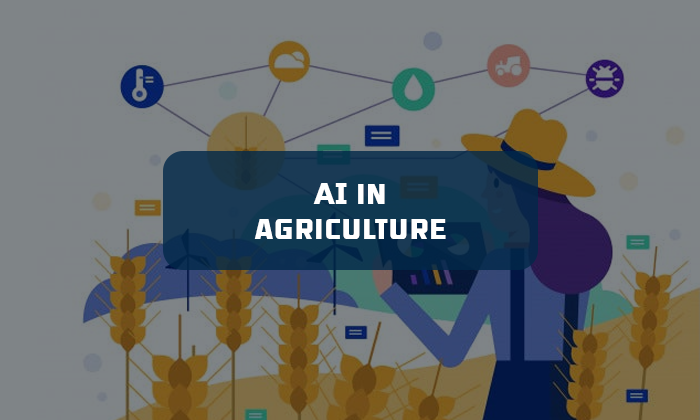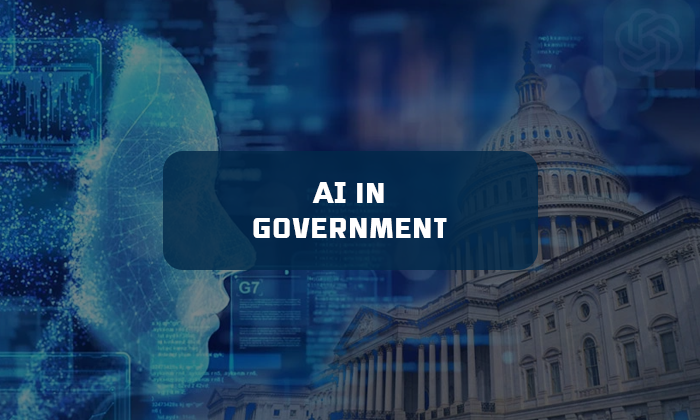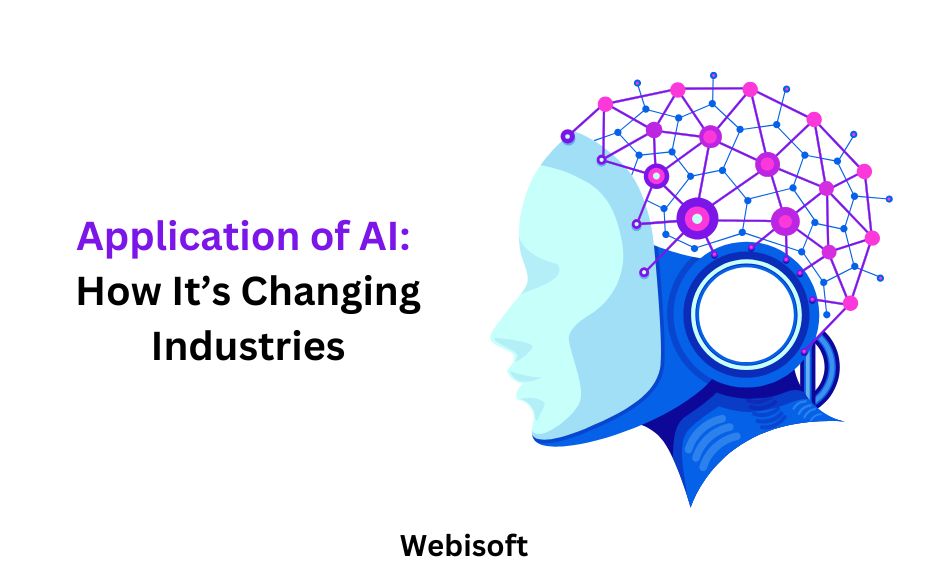Artificial Intelligence, or as we lovingly call it, AI, has been making waves in the digital world and beyond. Its uses range from simple tasks in our day-to-day lives to complex operations in various industries.
Did you know when you ask your voice assistant to set an alarm or ask for the day’s weather, you’re essentially interacting with AI? This is just the tip of the iceberg.
According to market research firm Grand View Research, the global artificial intelligence market is expected to reach a staggering valuation of USD 733.7 billion by 2027, growing at a compound annual growth rate (CAGR) of 42.2% during the forecast period.
Whether it’s powering the recommendations on your favorite streaming service, helping doctors diagnose diseases, or even enabling self-driving cars, AI is making what once seemed impossible, a reality.
AI is not confined to a distant future anymore – it’s here, and it’s transforming the way we live, work, and play. AI’s applications are far-reaching and pervasive, integrating seamlessly into our routines.
Intrigued? Stick around, because we’re about to journey through the fascinating landscape of AI and its applications. Ready to dive into the world where technology and daily life intersect in the most extraordinary ways? Let’s go!
Contents
Some Interesting AI Facts and Figures You Should Know
- Statista forecasts that global AI software revenue could hit 126 billion dollars by 2025.
- Gartner’s data shows that 37% of organizations are using AI in some way, a 270% growth in the last four years.
- Servion Global Solutions projects that by 2025, AI will be behind 95% of customer interactions.
- A 2020 Statista report indicates a projected year-on-year growth of about 54% for the global AI software market, expected to reach $22.6 billion.
Now, let’s check out where AI has stepped and ruled.
AI Use Cases and Applications in Major Industries

Artificial intelligence (AI) has become a transformative technology across various industries, revolutionizing processes, enhancing decision-making, and optimizing operations. Here are ten major industries where AI is being extensively utilized:
Healthcare

When we peek into the realm of medical imaging, AI really shines. It works its magic by scanning medical images such as X-rays, CT scans, and MRIs to spot anything out of the ordinary, aiding in diagnosis. This assists doctors and clinicians to make precise and timely decisions.
Jump over to precision medicine, and you’ll find AI elbow-deep in tons of patient data, including genetic and clinical info. The goal? To tailor treatment plans to the individual. By spotting patterns and links, AI algorithms can suggest therapies right on target and even predict how well treatments might go.
Now, let’s step into the lab. AI is putting the pedal to the metal in drug discovery. It can simulate how molecules interact, predict a drug’s effectiveness, and spot potential drug targets. This slices away at the time and cost that comes with traditional drug development, making for quicker breakthroughs in pharmaceutical research.
Last but not least, AI is even stepping in as a virtual nurse. These chatbot-based systems can answer patient questions, keep an eye on health conditions, and provide helpful info and guidance. This not only improves the patient experience but also takes some weight off the shoulders of healthcare professionals.
Finance

Fraud detection and prevention in the finance industry have seen remarkable improvements with the integration of AI algorithms.
Through the analysis of copious amounts of transaction data, AI quickly identifies suspicious patterns and anomalies that could indicate potential fraudulent activities. The result is enhanced protection for customers and financial institutions against financial loss and reputational damage.
When it comes to risk assessment, AI again proves to be an indispensable tool. Various factors, such as credit history, income, and market trends, are assessed by AI models to evaluate creditworthiness, predict potential loan defaults, and assess investment risks.
The data-driven decisions made possible by these AI-powered models optimize lending and investment strategies.
Customer service in the finance industry has also been reshaped by AI, particularly through the use of virtual assistants and AI-powered chatbots. By handling routine inquiries and offering personalized recommendations, these tools improve customer satisfaction and alleviate the workload of customer service teams.
Lastly, AI has left a significant imprint on algorithmic trading. Through the analysis of market trends, news sentiment, and historical data, AI algorithms make high-frequency trading decisions. The ability to process large volumes of data quickly and execute trades improves trading efficiency markedly.
Manufacturing

In the manufacturing industry, the transformative power of Artificial Intelligence (AI) is palpable. Take predictive maintenance, for example.
Here, AI systems actively monitor equipment conditions, skillfully analyze data patterns, and anticipate potential breakdowns. This means manufacturers can spot the early signs of equipment deterioration and proactively schedule maintenance, leading to minimized downtime and enhanced operational efficiency.
Quality control is another realm where AI is carving out a significant niche. With the assistance of AI-powered vision systems, products on assembly lines undergo meticulous inspection.
The result is consistent quality control, as defects are detected, reducing the need for manual inspection and boosting the overall product quality.
AI’s influence extends beyond quality control to optimize supply chains. By analyzing historical data, market trends, and demand, AI enhances inventory management, demand forecasting, and logistics, leading to efficient planning, cost reduction, and improved customer satisfaction.
Of course, the impact of AI doesn’t stop there. It has a considerable role in the realm of robotics and automation.
Through AI-powered robots and collaborative robots (cobots), repetitive and physically demanding tasks like assembly processes and material handling are automated. The benefits are multifold – increased productivity, error reduction, and improved safety for workers.
Retail

Revolutionizing the retail industry, Artificial Intelligence (AI) plays a key role in enhancing customer experiences, optimizing operations, and personalizing marketing.
For instance, AI is the backbone behind the personalized recommendations you receive while shopping. It’s all about the algorithm, which takes into account customer behavior, purchase history, and individual preferences.
The result? A boost in cross-selling, upselling opportunities, and a more engaged and satisfied customer base.
Moving beyond recommendations, the impact of AI on customer service is undeniable. With AI-powered chatbots and virtual assistants, real-time assistance and support throughout the buying process have never been easier.
By automating routine tasks, customer inquiries are handled swiftly, and response times are reduced, leading to elevated customer service experiences.
But it doesn’t stop there. AI also makes its presence known behind the scenes in the realm of demand forecasting and inventory management.
A deep dive into historical sales data, market trends, and external factors allow AI algorithms to accurately predict demand, streamline inventory levels, and reduce stockouts and overstock instances. The result is a smoother supply chain, minimized costs, and a better inventory turnover rate.
Computer vision technology, powered by AI, is also making a difference in retail. From shelf monitoring to product placement optimization, AI algorithms are hard at work.
Analyzing images and video footage, they ensure that products are appropriately stocked, shelves are well-maintained, and planograms are followed. This level of organization improves store operations and ultimately, the shopping experience of the customers.
In conclusion, AI in the retail industry is much more than a trend. It’s a tool allowing retailers to understand customer preferences better, streamline operations, and personalize the shopping experience. All these benefits work together to drive growth and ensure a competitive edge in the market.
Transportation and Logistics

Route optimization is a significant application of AI in the transportation and logistics industry. AI algorithms come into play to analyze factors such as traffic patterns, weather conditions, and delivery constraints. As a result, more efficient routes for logistics operations are determined, cutting transportation costs, improving delivery times, and enhancing overall efficiency.
When it comes to supply chain management, AI proves essential. It combs through loads of data, from inventory levels to supplier performance, helping streamline processes and minimize stockouts. The result? More efficient logistics, better inventory management, and significant cost savings.
Beyond supply chain management, AI-powered predictive analytics assist in demand forecasting. This enables companies to accurately anticipate future demand patterns, leading to better resource allocation, inventory planning, and capacity management.
Safety isn’t neglected in the wake of AI’s advances in transportation. Autonomous vehicles and driver-assistance systems utilize AI algorithms to analyze sensor data and make real-time decisions.
The navigation of vehicles becomes safer, obstacles are detected more reliably, and accidents can be prevented. This technology has the potential to revolutionize transportation by reducing accidents, improving traffic flow, and enabling more efficient and sustainable mobility solutions.
Energy

The energy sector leverages AI to optimize energy generation, improve grid management, and enhance energy efficiency. AI algorithms analyze sensors and smart meters data to predict energy demand patterns, optimize energy distribution, and balance supply and demand. This enables more efficient energy production and reduces wastage.
AI also plays a role in renewable energy management. By analyzing weather forecasts, energy consumption patterns, and market data, AI algorithms can optimize the integration of renewable energy sources into the grid. This helps maximize renewable energy utilization and minimize reliance on fossil fuels.
In addition, AI-powered predictive maintenance is used in the energy sector to monitor equipment conditions and identify potential failures. By detecting anomalies and patterns in sensor data, AI systems can predict maintenance needs, reduce downtime, and optimize maintenance schedules. This leads to improved operational efficiency and cost savings.
Agriculture

Farmers are getting a big helping hand from AI to grow healthier crops and manage resources effectively. By taking a deep dive into satellite imagery, weather data, and soil conditions, AI algorithms can offer insights on everything from crop growth patterns to when’s the best time to plant. This translates to smarter decisions, better resource use, and less waste, ultimately boosting productivity.
Stepping into the field, we find AI-powered drones and robotics hard at work. They’re doing the heavy lifting of monitoring crop health, spotting pest infestations, and applying targeted treatments. This automation of repeat tasks coupled with real-time data makes farming operations more accurate and efficient.
Dig a little deeper, and you’ll find IoT sensors nestled in the fields. These sensors feed data to AI systems, monitoring everything from soil moisture to temperature and nutrient content. This information guides farmers to make data-driven decisions about watering schedules, fertilization plans, and resource management.
It doesn’t stop there, though. AI is also playing doctor to the crops. By looking closely at images of plants, AI algorithms can spot diseases or nutrient deficiencies early on. This means quicker intervention and healthier crops.
Education

The way we learn is getting a facelift, thanks to AI. With adaptive learning platforms, AI algorithms take a deep dive into student data, learning styles, and performance. This allows them to churn out personalized learning materials and recommendations.
The result? Students can learn at their own pace, address their specific needs, and boost their academic performance.
When it comes to educational content development, AI isn’t missing out either. Using Natural Language Processing (NLP), AI can sift through heaps of text to create educational content, automate grading of assignments, and give feedback to students. This takes a load off teachers and paves the way for scalable and personalized education.
Ever wondered how your questions get answered so fast? Say hello to AI-powered chatbots in educational institutions. They’re on standby to answer student queries, provide guidance, and lend a hand with administrative tasks. This not only improves administrative efficiency but also ensures students get accurate information quickly.
What about online exams? AI has it covered too. Online proctoring systems use AI to keep an eye on student behavior, eye movements, and other data points during exams. Any suspicious activities are quickly flagged, helping to maintain the integrity of online assessments.
Entertainment and Media

There’s a revolution happening in the entertainment and media industry, and AI is at the helm. One way AI is making waves is by digging deep into large datasets of user preferences, viewing history, and social media activity.
The result? Personalized content recommendations that hit the mark every time. This not only makes users happier, but it also boosts engagement and satisfaction.
Move over to content creation, and AI is leaving its mark there too. It’s using technologies for video and image analysis, speech recognition, and natural language generation.
This allows AI to whip up video summaries, create personalized news articles, and produce tailored advertising content. All this leads to better content production efficiency and personalized storytelling that truly connects with the audience.
Then there’s the customer service sector in the entertainment industry, where AI-powered virtual assistants and chatbots are making lives easier.
From handling customer inquiries to providing recommendations and support, these systems boost the overall user experience while taking the load off customer service teams.
Government

Governments are leaning into the power of AI to make their processes smoother and more efficient. One way they’re doing this is through AI-powered data analytics.
This helps analyze large volumes of data, picking up trends, patterns, and insights that can aid in resource allocation and policy-making, and help tackle societal challenges.
Shifting gears to public safety and security, AI’s contribution is nothing short of groundbreaking. Facial recognition systems powered by AI are now crucial for identifying and tracking individuals, giving law enforcement a helping hand.
Moreover, AI algorithms can analyze surveillance data, detect anything out of the ordinary, and alert authorities to potential security threats.
Then there’s the administrative side of things, where AI technologies are making tedious tasks a thing of the past. Chatbots and virtual assistants step in to handle citizen inquiries, provide information, and streamline processes like renewing a license or applying for a permit.
And the outcome? Better efficiency, quicker response times, and happier citizens.
Frequently Asked Questions
Which are the sectors that use artificial intelligence in the present?
The sectors that extensively use artificial intelligence in the present include healthcare, finance, manufacturing, retail, transportation and logistics, energy, agriculture, education, entertainment and media, and government. These sectors leverage AI to improve efficiency, enhance decision-making, automate processes, personalize experiences, and drive innovation.
What is the application of AI in space exploration?
AI has significant applications in space exploration. It is used for tasks like satellite image analysis, spacecraft control, autonomous navigation, data analysis for scientific research, and robotic exploration of celestial bodies. AI enables efficient data processing, enhances autonomous decision-making, and aids in understanding the vastness of space.
Why do we need artificial intelligence in different sectors?
Artificial intelligence is needed in different sectors for several reasons. It allows for advanced data analysis, pattern recognition, and predictive capabilities, enabling better decision-making and improved efficiency. AI automates repetitive tasks, reducing human error and freeing up time for more complex and strategic activities. It enables personalized experiences, enhances customer service, and optimizes resource allocation. AI also has the potential to unlock new insights and drive innovation, ultimately leading to growth and competitive advantage in various sectors.
Conclusion
In a nutshell, AI is a game-changing tech with a wealth of applications in many areas. It gives businesses the power to harness the insights in their data, automate tasks, and offer a personalized touch.
Whether it’s improving health outcomes, making logistics more efficient, boosting learning, or streamlining financial services, AI is reshaping industries and paving the way for the future.
But as we continue to push the boundaries of what AI can do, it’s vital to consider the ethics of AI and use it responsibly, making sure we’re clear, fair, and respectful of privacy.
Exploring the applications of AI is an ongoing journey, and there’s still so much more we could discover. It’s a technology that could unlock countless innovative solutions and change industries in ways we can’t even imagine yet.
There will be challenges along the way, but as we continue to explore what AI can do, there’s a lot to get excited about, promising advances that could usher in a new era of efficiency, innovation, and a better quality of life.
So, interested in exploring the power of AI for your business? The expert team at Webisoft is ready to help you develop AI applications tailored to your needs. Reach out to us today!
